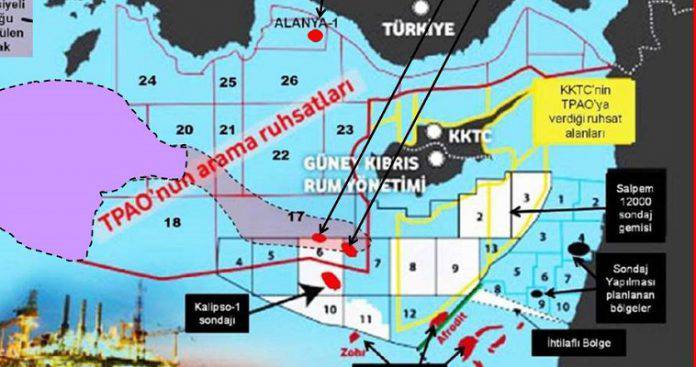Ilias Konofagos: Remember Salamis! – The Greek Minister of Energy turns his back on gas fields
27/10/2020
Sovereignty over the sea concerns the right of a state to have full control over an offshore area. This control gives the right, among other things, to the exploitation of the offshore mineral hydrocarbons of the region.
It includes two main separate activities which are the exploration and exploitation of hydrocarbon deposits. The research concerns a first phase for the identification and certification of these deposits. The exploitation concerns a second phase for the production and marketing of the products of exploitation, ie oil and gas. From an economic point of view, there is a significant gap between the first and the second phase.
The research phase includes only expenses, until the completion of the certification of the existence sufficient or insufficient quantities of hydrocarbon reserves. In contrast, the exploitation phase involves a significant period of revenue generation for both the amortization of research and exploitation investments and the acquisition of significant net profits.
The importance of exploitation rights
The largest gas field in the Mediterranean, the Zohr field was discovered in September 2015 southeast of Kastellorizo, with reserves of 30 trillion cubic feet of gas, with one billion barrels of oil condensate (see first image). The gross value of this field based on the selling price of natural gas in Egypt, five dollars per thousand cubic feet and 50 per barrel of oil condensate, is a total of 200 billion euros.
The latest scientific research in the Eastern Mediterranean shows that the Zohr deposit is not unique, but repeated in the major offshore area between Cyprus and Crete. And as we will see in the images that follow, this possibility of repetition reaches as far as Libya via Crete.
This opportunity opened the door for Turkey to locate and discover gas deposits south of Kastellorizo, especially between Cyprus and Crete, where the sea depths are known to be around 3,000 meters. This situation have led Greece and Turkey to a constant and dramatic geopolitical tension in this region.
This tension primarily concerns sovereign rights, although at present Turkey does not have the necessary technology to exploit submarine deposits that could generate significant revenue at such depths. But from a research point of view, Turkey has three vessels with geophysical seismic records and three drilling rigs, the cost of which in full operation amounts to a total of 2,500,000 euros per day, ie at a cost of almost one billion euros per year.
So as long as these activities continue, Turkey bears only significant annual costs, with at least no corresponding economic benefits yet. The question is how long will Turkey be able to endure this situation of economic bleeding internally, without any repercussions for its economy on the international market.
The deposits and their benefits
Given that it will take at least fifteen years for Turkey to finally acquire the corresponding technology for the exploitation of deposits at such sea depths, it is clear that during this period Greece has the necessary time to formulate the necessary strategy that will allow it to emerge from the impasse that exists today. To acquire the initiative through its own fields, especially west and southwest of Crete. These would allow it to secure significant revenue in the medium term, for the benefit of its economy and defense capabilities.
The exploitation of the Egyptian Zohr field by the company EMI, which today is – in just five years – in full production capacity of 500,000 equivalent barrels of oil per day, generates gross revenues of about seven billion euros per year. It should be noted that the (state) Hellenic Hydrocarbon Management Company (EDEY SA) has so far identified at least 16 Zohr-type targets in the offshore areas west and south of Crete (see image below), most of which appear to be even larger than the corresponding Zohr deposit (100 km2).
Therefore, the long-term economic potential of gross income for Greece is extremely interesting. Given a minimum chance of discovering a deposit per well of 20%, it would be possible to discover at least three Zohr-type deposits in the two above-mentioned areas in the future, which could generate daily gross revenues of € 21 billion per year.
Turkey is predatorily seeking to consolidate sovereign rights within the Greek EEZ and thus achieve at some point a massive exploitation of natural gas deposits between Cyprus and Libya for the benefit of its economy. While this is happening, the competent Greek Ministry of Energy takes care with its announcements to devalue the prospect of exploitation of hydrocarbons in Greece, considering that this is in favor of green energy worldwide!
The utopia of green energy
The competent ministry, which today is unabashedly cutting off all lignite plants in Northern Greece, would do well to read at some point the report of the Energy Committee of the French Academy, which was sent to President Macron. This states that the full prevalence of green energy (which we all want) is in fact a utopia, if in the next 30-35 years there is no support for green energy from another form of energy, which in Greece could be domestic gas!
At the same time, the Ministry of Energy made no attempt to negotiate with the Government of Azerbaijan, before giving the license to operate the Turkish-Azerbaijani pipeline TAP-TANAP (which passes free through the territory of Greece) and whose revenues are expected to allow in Baku to more easily complete its attack against the Armenians, with the help of Turkey.
The Greek government must realize that Turkey’s research efforts to plunder Greek gas fields have led to significant expenditures, which could potentially create a serious internal political problem for the Erdogan government. This provided that at some point he will not soon receive revenue from these activities. Turkey, however, at such great depths of the sea, is not expected to mine and generate revenue before at least 15 years have passed.
In conclusion, we note with regret that the competent Ministry of Energy, today deals with development projects that facilitate exclusively the import of mineral wealth. These, however, create jobs abroad. It is questionable why the competent minister does not care, why it does not try to promote the exploitation of domestic mineral wealth, especially gas fields. Their utilization will create jobs in Greece that will support the national economy, but at the same time the coveted green energy, for which the whole government is being cut with one-dimensional fanaticism.








